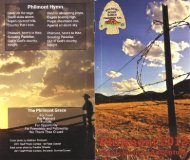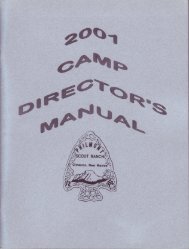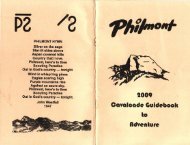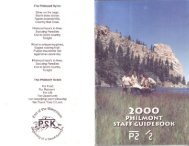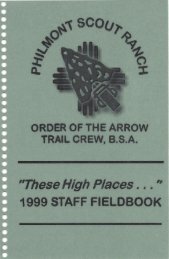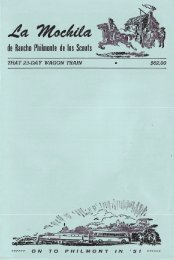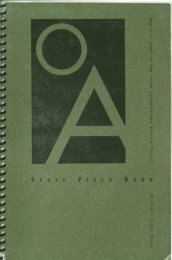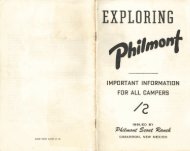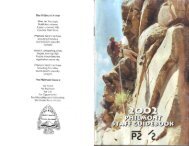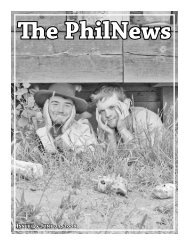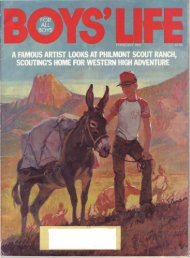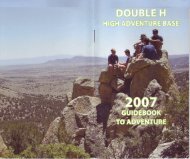Guidebook 2008.pdf
Guidebook 2008.pdf
Guidebook 2008.pdf
You also want an ePaper? Increase the reach of your titles
YUMPU automatically turns print PDFs into web optimized ePapers that Google loves.
PRESERVING THE PHILMONT WILDERNESS<br />
Philmont is a magnificent wilderness camping area with an immense network<br />
of trails and camps tied together by service roads designed for service<br />
and protection of both campers and land.<br />
Since 1938, thousands of young people have enjoyed the great scenic beauty<br />
of Philmont's mountain terrain and experienced the unique and memorable<br />
programs of its staffed camps. However, in the past, a number of inconsiderate<br />
and impolite Scout campers, employing improper camping methods have<br />
marred certain areas of this magnificent land. Consequently, Philmont asks<br />
all campers and their Advisors to commit themselves to good Scout camping<br />
and genuine wilderness understanding.<br />
Each camper and Advisor will be asked to sign the Philmont Wilderness<br />
Pledge, which declares that he or she will do everything possible to preserve<br />
the beauty and wonder of the Philmont wilderness and its facilities through<br />
good Scout camping. It is expected that Philmont campers will carry this<br />
pledge to all camping areas that they might visit throughout America.<br />
WILDERNESS PLEDGE<br />
The major areas of emphasis involved in the Philmont Wilderness Pledge are:<br />
Litter and Graffiti<br />
Each camper should make sure that all trails and campsites are left neat and<br />
clean, including Camping Headquarters, shower and tent areas.<br />
While litter can be picked up, graffiti often permanently defaces BSA property<br />
and detracts from the "Philmont experience". Do not contribute to this<br />
problem.<br />
Wildlife<br />
Respect Philmont's wildlife, including livestock. Follow all guidelines regarding<br />
food handling and trash disposal. Never feed or harass wild animals.<br />
Water<br />
You are in a land where water is scarce and very precious. Conservation<br />
and wise use of water has been practiced since the first person entered this<br />
land. Use water properly; never bathe or do laundry or dishes in or near a<br />
spring or stream. Do not disturb or throw rocks in springs, or touch any solar<br />
pumps. They are easily damaged and the flow of water can be disrupted.<br />
Everyone needs water, and you should leave each spring and stream as clean<br />
as you found it.<br />
Trails<br />
Pledge to respect Philmont trails. Do not cut green boughs or trees, or mark<br />
on them. Do not cut across switchbacks, and do not alter or change trail signs.<br />
Campsites<br />
Each crew is responsible for leaving a neat and orderly campsite, whether<br />
it be in Camping Headquarters, staffed camps, or nonstaffed camps. Your<br />
28<br />
campsite should be left litter-free with its latrine and sump clean. Fires, if<br />
permitted, must be left DEAD OUT and then cleaned of debris before you<br />
leave. Do not trench tents; pitch them on high ground. You should respect the<br />
feelings of those crews camping near you and those that will come after you.<br />
Philmont serves over 20,000 Scouts, Venturers, and leaders each year.<br />
Consequently, some trails and camps are subjected to heavy use.<br />
Nevertheless, it is not the wear of so many pairs of boots that mars Philmont.<br />
It is the carelessness and thoughtlessness of inconsiderate campers. It is<br />
our sincere hope that through your commitment to the Philmont Wilderness<br />
Pledge, Philmont will always remain a beautiful and clean place to enjoy<br />
high adventure.<br />
REPORT ARTIFACTS<br />
Philmont is a natural outdoor biological, geological, archaeological, and historicallaboratory<br />
and museum. Countless varieties of rock, plants, and animals<br />
are found here, as well as abundant evidence of past human habitation<br />
from prehistoric Indians (arrowheads, potshards, grinding stones, etc.) to old<br />
mining camps (bottles, cans, equipment, cabins, etc.). Specimens of plants,<br />
animals, or artifacts, such as mentioned above, are to be observed and left<br />
where you discover them, not collected and removed from Philmont. Reports<br />
of discoveries are helpful in reconstructing Philmont's archaeological and historical<br />
past. These should be put in writing and left at the Philmont Museum.<br />
SAFE AND HEALTHY CAMPING AND HIKING<br />
Strict adherence to proper health and safety practices is crucial at Philmont.<br />
Campers are responsible to themselves for remaining strong and healthy.<br />
Failure to purify water or to rinse dishes thoroughly may affect everyone in<br />
the crew. Health and safety are a crew responsibility, as well as an individual<br />
one. Here are some wise trail practices that will help keep you and your crew<br />
strong, safe, and healthy.<br />
Dehydration<br />
Low humidity and strenuous activity cause your body to lose enormous<br />
amounts of fluids. You will dehydrate even though you do not feel thirsty.<br />
You need to drink more water than you usually do. Six to eight quarts per<br />
day is not excessive. The salt content of Philmont's menus is adequate to<br />
replace your loss of salt from sweating. Salt tablets are not recommended.<br />
Symptoms of dehydration include light-headedness, dizziness, nausea, general<br />
weakness, muscle cramps, and sometimes fever and chills. Hot, clear days<br />
accelerate loss of body fluids. Plan to hike early in the morning to avoid the<br />
intense heat of midday and potential dehydration problems.<br />
29



